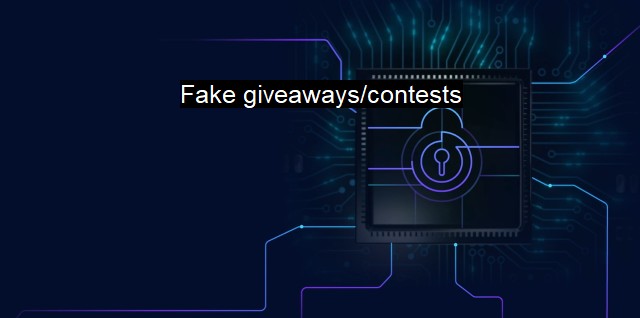What are Fake giveaways/contests?
Discovering the Truth about Online Giveaway Frauds: How to Recognize and Avoid the Rising Ping of False Contests and Promotions in Social Media.
In the modern digital world where cybersecurity threats like malware attacks, data breaches, or identity theft are on the rise, another deceptive practice called "fake giveaways or contests" has also developed. This practice directly targets internet users by tricking them with attractively presented freebies or contests with substantial rewards, where in reality, scammers seek to compromise their personal data and financial information.Fake giveaways or contests are one of the most popular and functional strategies cybercriminals use to lure internet users into their trap. The prospect of free gifts, extravagant vacations, or winning a large sum of money, often blinds the victims to the deception. In the cybersecurity context, these fake contests and giveaways use advanced techniques of social engineering that manipulate individuals to breach their personal or financial information willingly.
The mode of operation of these deceptive practices is fairly straightforward. The scam typically starts with a seemingly benign advertisement, email, or social media post that invites the user to participate in a contest or giveaway. Once users interact with these deceptive campaigns and provide their personal information, entered into the scammers' database and used for malicious purposes. In worst-case scenarios, users also download harmful malware disguised as part of the contest application process, taking the scam to a whole different level by exploiting the victims' devices.
Predictably, the notorious popularity of social media platforms has made them a favorite ground for scammers to run these fake giveaways. Platforms such as Facebook, Instagram, and Twitter are frequently used channels, with Instagram being a common arena due to the ‘high rewards, low risk’ of scammers being identified or caught.
At times, to legitimize deceitful contests, the fraudsters adopt clever tactics like using the name and logos of well-known corporations or creating an impersonation of a celebrity profile. Such techniques play with the psychology of their victims, making them more vulnerable to fall for the scam as they associate it with a trusted and credible brand.
Apart from social media, hackers also exploit other digital platforms like email and websites. Phishing is a preferred cyberattack technique associated with scam giveaways, wherein attackers impersonate legitimate organizations via email to trick victims. Clicking on the malicious links in these mailings could install malware or ransomware on the user's device, giving the attacker complete control over the machine.
Recognizing the potential threats of these scams, antivirus and cybersecurity firms have stepped up to address the challenge. Cybersecurity software now comes with features that enable detection of phishing attacks, spam emails, and malicious downloads. Blocking such threats and providing real-time protection prevents users from falling prey to scammers.
Education remains critical in countering fake giveaways and contests scams. Users must be cautious when reminiscing about potential scams; they should avoid providing their information if the details of the contest are unclear or seem too good to be true. It's also wise not to click on links in suspicious emails. One practical habit to adopt would be to manually type the URL of the giveaway page instead of clicking on a direct link.
Fake giveaways and contests represent a significant cybersecurity threat. Falling for these deceptive schemes can expose unwary users to financial loss and potential identity theft. Hence, always staying vigilant, employing robust cybersecurity measures, and questioning the authenticity of the giveaways are all crucial in maintaining a safe digital lifestyle.

Fake giveaways/contests FAQs
What are fake giveaways/contests in the context of cybersecurity and antivirus?
Fake giveaways/contests in the context of cybersecurity and antivirus refer to those fraudulent campaigns that promise free antivirus software or a chance to win some gadget or cash prize, but in reality, they are a deception to extract personal information or spread malware.How can I identify fake giveaways/contests?
You can identify fake giveaways/contests by carefully examining the legitimacy of the sponsor, the promotional material, and the registration process. You should also avoid clicking on suspicious links, downloading unknown files, or entering personal details to claim the offer.What are the risks of participating in fake giveaways/contests?
Participating in fake giveaways/contests can expose you to various risks, such as identity theft, financial fraud, malware infection, and phishing attacks. The scammers may use your personal information to access your accounts, steal your money, or sell it to other criminals. They may also infect your device with malware that can damage your files, steal your passwords, or spy on your activities.How can I protect myself from fake giveaways/contests?
To protect yourself from fake giveaways/contests, you should always check the authenticity of the offer, read the terms and conditions, and verify the legitimacy of the sponsor. You should also use a reliable antivirus software that can detect and block malware, and keep it up-to-date with the latest security patches. Moreover, you should educate yourself about common cybersecurity threats and best practices, and use strong and unique passwords for your accounts.| | A | | | B | | | C | | | D | | | E | | | F | | | G | | | H | | | I | | | J | | | K | | | L | | | M | |
| | N | | | O | | | P | | | Q | | | R | | | S | | | T | | | U | | | V | | | W | | | X | | | Y | | | Z | |
| | 1 | | | 2 | | | 3 | | | 4 | | | 7 | | | 8 | | |||||||